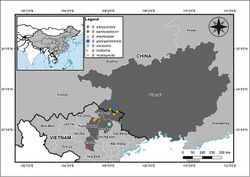Begonia bambusetorum
| Notice: | This page is derived from the original publication listed below, whose author(s) should always be credited. Further contributors may edit and improve the content of this page and, consequently, need to be credited as well (see page history). Any assessment of factual correctness requires a careful review of the original article as well as of subsequent contributions.
If you are uncertain whether your planned contribution is correct or not, we suggest that you use the associated discussion page instead of editing the page directly. This page should be cited as follows (rationale):
Citation formats to copy and paste
BibTeX: @article{Chen2018PhytoKeys, RIS/ Endnote: TY - JOUR Wikipedia/ Citizendium: <ref name="Chen2018PhytoKeys">{{Citation See also the citation download page at the journal. |
Ordo: ORDO
Familia: FAMILIA
Genus: Begonia
Name
Begonia bambusetorum H.Q.Nguyen, Y.M.Shui & W.H.Chen sp. nov. – Wikispecies link – Pensoft Profile
- Begonia sect. Diploclinium A. DC.
Remarks
The new species is similar to Begonia sinovietnamica C. Y. Wu in their habit and distribution (Fig. 1; Fig. 2), but different from the latter species in expanding villous hairs on petiole and peduncles (vs. pubescent), 2 petals of the male flowers (vs. 4 petals), 2 petals of the female flowers (vs. 5 rarely 4 petals).
Type
VIETNAM. Bac Kan Province, Nari county, An Tinh committee, 22°12’39”N, 106°05’02”E, 285 m a.s.l., in the forests of Bamboo around streams, flowers pinkish, 23 April 2016, Y.M. Shui, W.H. Chen, C. Liu, H.Q. Nguyen, H.T. Nguyen, N.Q. Chuong CK 1296 (holotype, KUN!; isotype, CPC!)
Herb, rhizomatous
Rhizome: densely villous, 9–19 cm long, 0.5–1 cm in diam. Stipule reddish, triangular, 0.8–1.5 × 0.4–0.7 cm, densely villous outside, glabrous inside, margin entire and ciliate. Leaves: petiole terete, greenish to reddish, villous, 14–19 cm long, 1.5–3 mm in diam.; blade greenish, asymmetric, ovate to widely ovate, 11–17 × 8.5–11.5 cm, slightly rugose; base cordate, apex caudate, margin serrulate and long ciliate; adaxially greenish, sparsely brevi-setose, abaxially greenish, sparely villous and densely strigose on veins; venation palmate, 6–8 primary veins, secondary veins brunching dichotomous, tertiary veins slightly reticulate, veins prominent on both sides. Inflorescence: dichasial cyme, peduncle erect, 4–10 cm long, villous; bracts caducous, triangulate to lanceolate, reddish, 5–7 × 2–3 mm, adaxially red villous, apex acuminate, margin serrate and ciliate, abaxially glabrous. Staminate flower: pedice 1–1.5 cm long; tepals 2, white to pink, adaxially red villous, abaxially glabrous; tepals 2, widely ovate, 1.5–2 × 0.7–1 cm, apex obtuse to rounded, margin entire; androecium actinomorphic, stamens numerous, filaments almost free, 1–2 mm long, anthers yellow, obovate, 1–1.2 mm long, apex convex, shorter than filaments, with two lateral longitudinal slits. Pistillate flower: pedicel 1–1.5 cm long; tepals 2, white to pink, adaxially red villous, abaxially glabrous; outer tepals 2, widely ovate, 1–1.5 × 0.7–1.2 cm, apex obtuse to rounded, margin entire; styles 3, free, stigmas bifid with twisted bands; ovary white, sparely red villous; placentation axile with 2-segments per locule. Capsule nodding, 0.35–0.5 cm long, 0.27–0.31 cm in diam. (wings excluded), with 3 subequal wings; abaxial wing 0.6–1 × 0.3–0.7 cm; lateral wings 0.4–0.7 × 0.5–0.7 cm.
Phenology
Flowering in May–June, fruiting in June–August.
Etymology
The epithet refers to the habitat of the new species: the bamboo forests along streams.
Habitat
The new species just grows in bamboo forests along watersides.
Distribution. The species occurs both in Nari county of Bac Kan Province in Vietnam and in Longzhou county of Guangxi, China.
Additional specimens examined
CHINA. Guangxi Zhuang Autonomous Region, Longzhou Xian, Chunxiu community, 22°21’22”N, 106°36’34”E, alt. 460 m a.s.l., November, 2016, cultivated in Horticulture Nursery of Beijing Florascape Company, in flowers, 1 October, 2017, Y. M. Shui and S. W. Guo BE-004 (KUN).
Note
The new species seems to be a member of the first group with rhizome and without erect stem in Begonia sect. Diploclinium A. DC. (Doorenbos et al. 1998[1]). Within the group, it is more similar to Begonia sinovietnamica in the locality and habit than the other, but different in the hairs of plants and morphology of the flowers. Additionally, its reticulate nerves on the upper surface of leaves are more obvious than those in B. sinovietnamica, which can easily be examined in living plants instead of in dry specimens.
Original Description
- Chen, W; Radbouchoom, S; Nguyen, H; Nguyen, H; Nguyen4, K; Shui, Y; 2018: Seven new species of Begonia (Begoniaceae) in Northern Vietnam and Southern China PhytoKeys, (94): 65-85. doi
Images
|
Other References
- ↑ Doorenbos J, Sosef M, de Wilde J (1998) The sections of Begonia including descriptions, keys, and species lists (studies in Begoniaceae VI). Wageningen Agricultural University Papers 98: 1–266.


